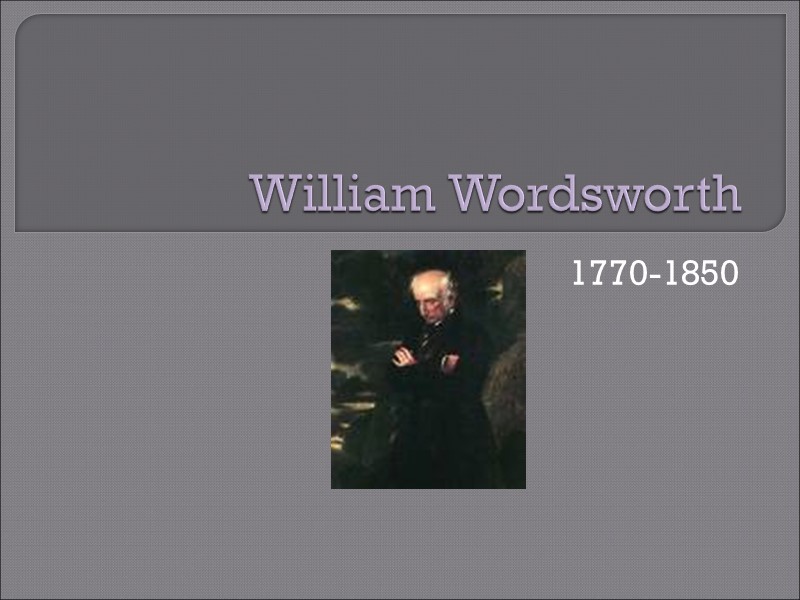 William Wordsworth 1770-1850
William Wordsworth 1770-1850
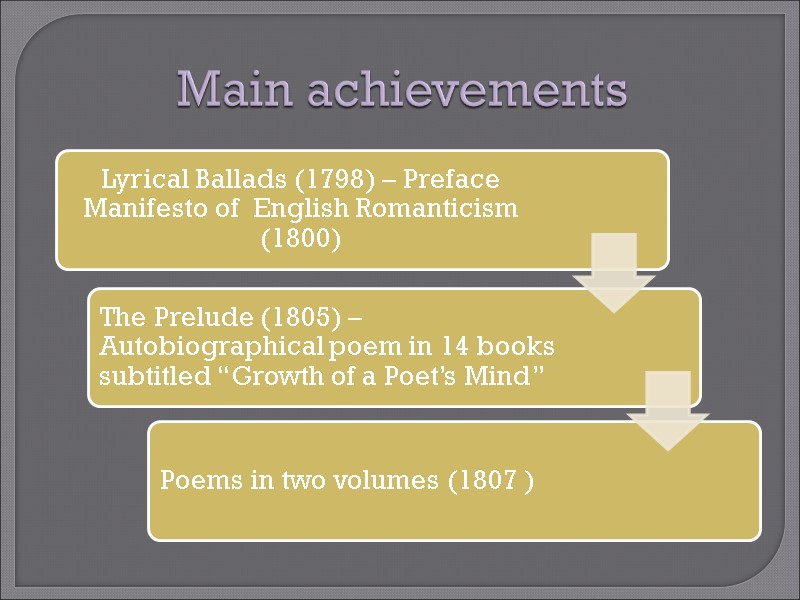 Main achievements
Main achievements
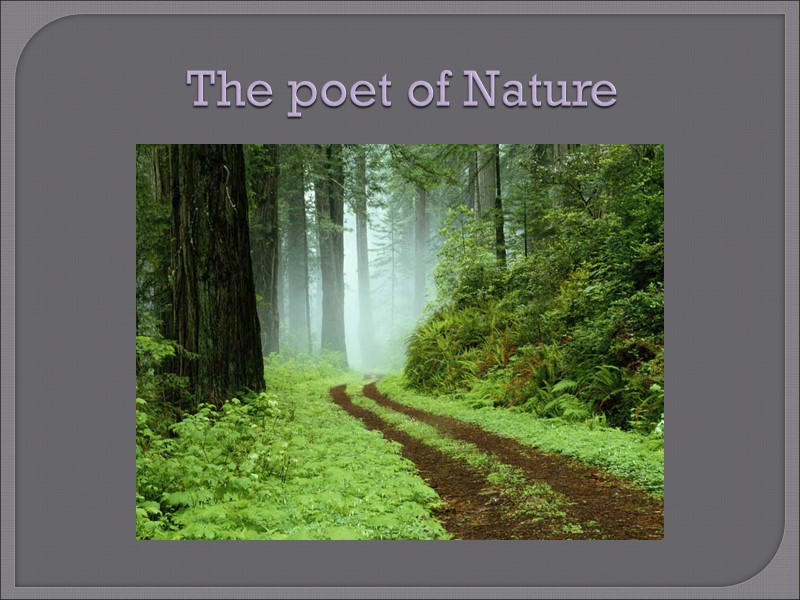 The poet of Nature
The poet of Nature
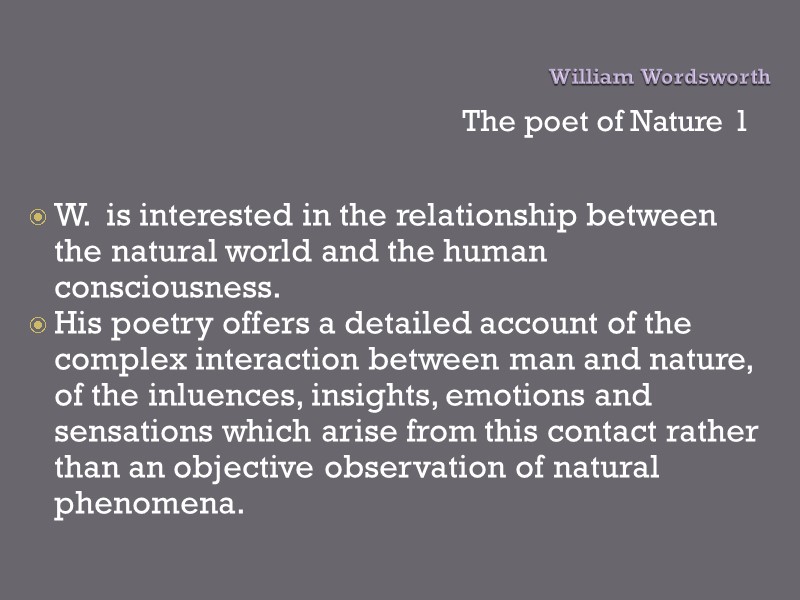 William Wordsworth The poet of Nature 1 W. is interested in the relationship between the natural world and the human consciousness. His poetry offers a detailed account of the complex interaction between man and nature, of the inluences, insights, emotions and sensations which arise from this contact rather than an objective observation of natural phenomena.
William Wordsworth The poet of Nature 1 W. is interested in the relationship between the natural world and the human consciousness. His poetry offers a detailed account of the complex interaction between man and nature, of the inluences, insights, emotions and sensations which arise from this contact rather than an objective observation of natural phenomena.
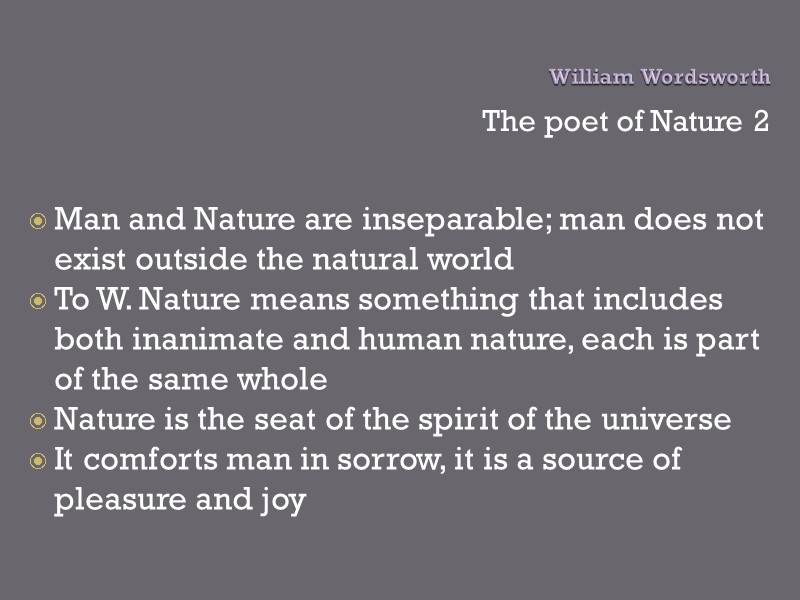 William Wordsworth The poet of Nature 2 Man and Nature are inseparable; man does not exist outside the natural world To W. Nature means something that includes both inanimate and human nature, each is part of the same whole Nature is the seat of the spirit of the universe It comforts man in sorrow, it is a source of pleasure and joy
William Wordsworth The poet of Nature 2 Man and Nature are inseparable; man does not exist outside the natural world To W. Nature means something that includes both inanimate and human nature, each is part of the same whole Nature is the seat of the spirit of the universe It comforts man in sorrow, it is a source of pleasure and joy
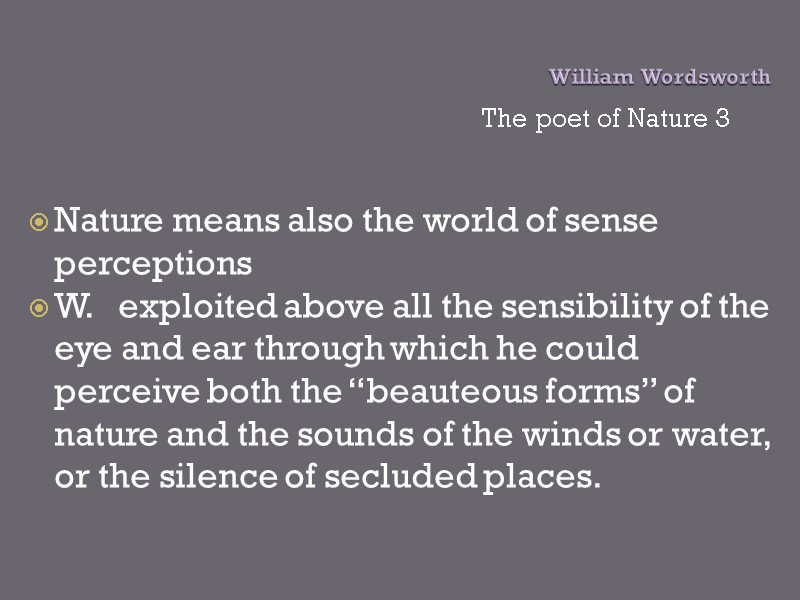 William Wordsworth The poet of Nature 3 Nature means also the world of sense perceptions W. exploited above all the sensibility of the eye and ear through which he could perceive both the “beauteous forms” of nature and the sounds of the winds or water, or the silence of secluded places.
William Wordsworth The poet of Nature 3 Nature means also the world of sense perceptions W. exploited above all the sensibility of the eye and ear through which he could perceive both the “beauteous forms” of nature and the sounds of the winds or water, or the silence of secluded places.
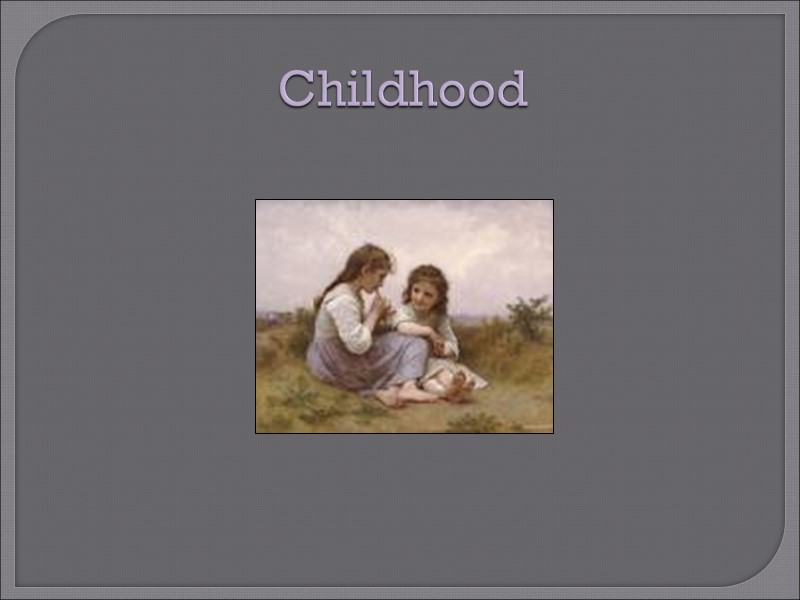 Childhood
Childhood
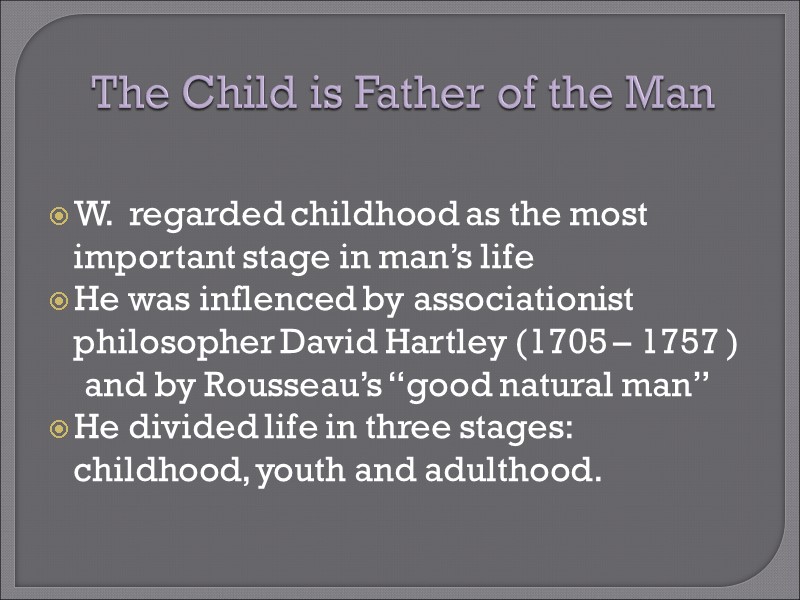 The Child is Father of the Man W. regarded childhood as the most important stage in man’s life He was inflenced by associationist philosopher David Hartley (1705 – 1757 ) and by Rousseau’s “good natural man” He divided life in three stages: childhood, youth and adulthood.
The Child is Father of the Man W. regarded childhood as the most important stage in man’s life He was inflenced by associationist philosopher David Hartley (1705 – 1757 ) and by Rousseau’s “good natural man” He divided life in three stages: childhood, youth and adulthood.
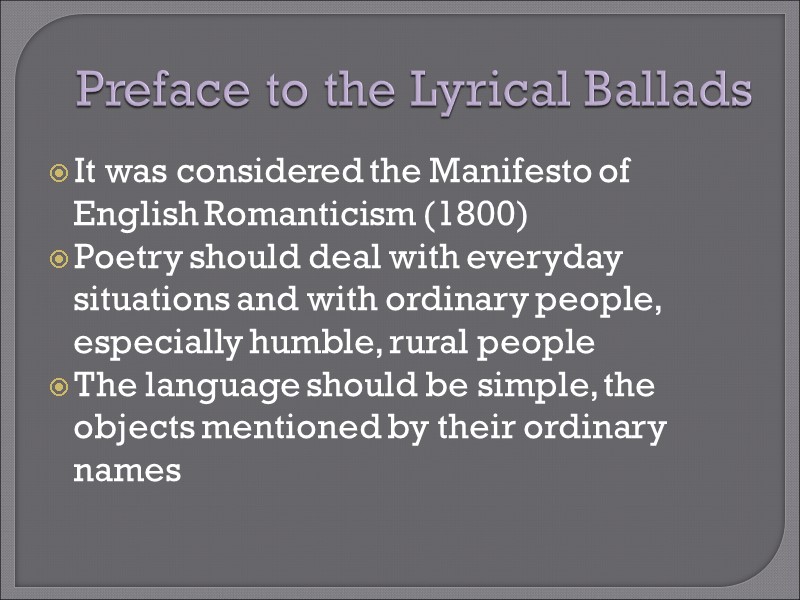 Preface to the Lyrical Ballads It was considered the Manifesto of English Romanticism (1800) Poetry should deal with everyday situations and with ordinary people, especially humble, rural people The language should be simple, the objects mentioned by their ordinary names
Preface to the Lyrical Ballads It was considered the Manifesto of English Romanticism (1800) Poetry should deal with everyday situations and with ordinary people, especially humble, rural people The language should be simple, the objects mentioned by their ordinary names
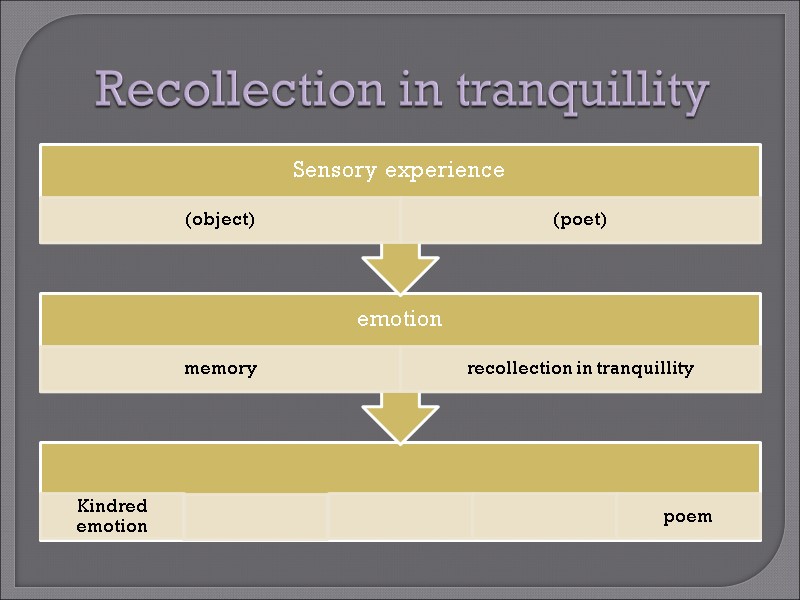 Recollection in tranquillity
Recollection in tranquillity
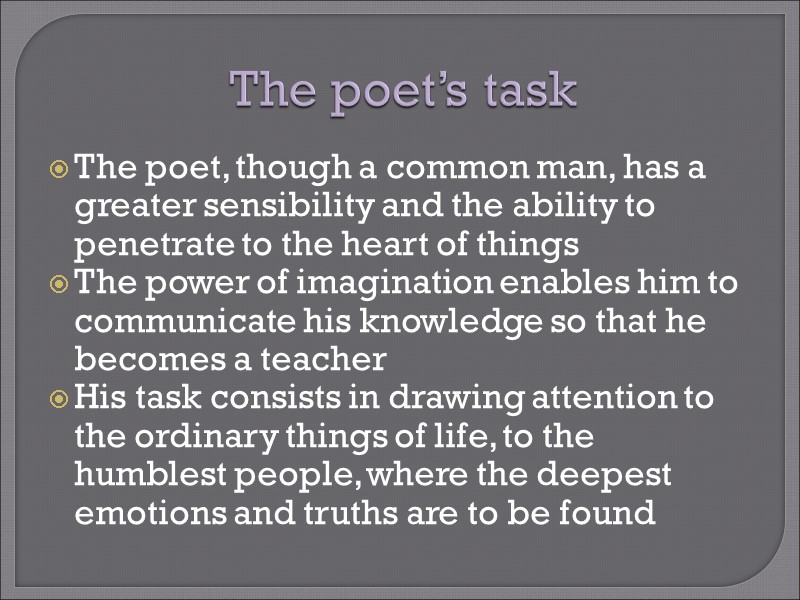 The poet’s task The poet, though a common man, has a greater sensibility and the ability to penetrate to the heart of things The power of imagination enables him to communicate his knowledge so that he becomes a teacher His task consists in drawing attention to the ordinary things of life, to the humblest people, where the deepest emotions and truths are to be found
The poet’s task The poet, though a common man, has a greater sensibility and the ability to penetrate to the heart of things The power of imagination enables him to communicate his knowledge so that he becomes a teacher His task consists in drawing attention to the ordinary things of life, to the humblest people, where the deepest emotions and truths are to be found
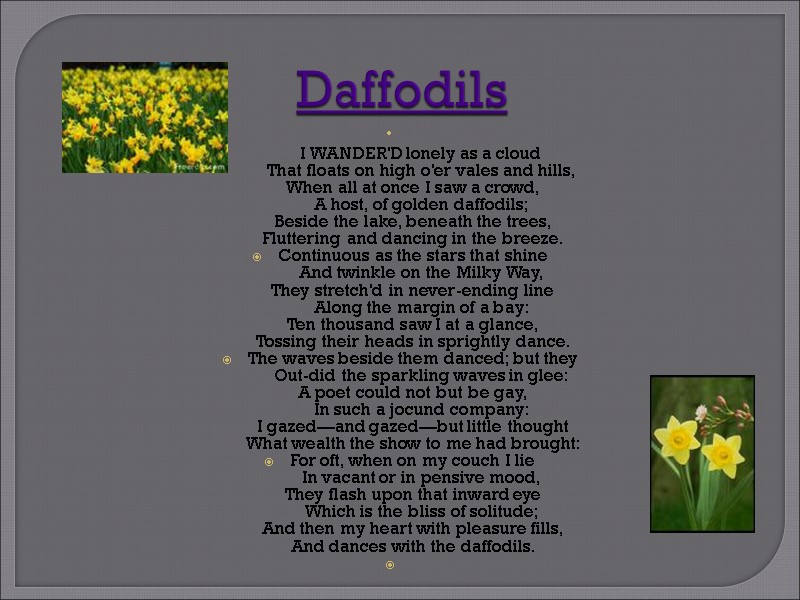 Daffodils I WANDER'D lonely as a cloud That floats on high o'er vales and hills, When all at once I saw a crowd, A host, of golden daffodils; Beside the lake, beneath the trees, Fluttering and dancing in the breeze. Continuous as the stars that shine And twinkle on the Milky Way, They stretch'd in never-ending line Along the margin of a bay: Ten thousand saw I at a glance, Tossing their heads in sprightly dance. The waves beside them danced; but they Out-did the sparkling waves in glee: A poet could not but be gay, In such a jocund company: I gazed—and gazed—but little thought What wealth the show to me had brought: For oft, when on my couch I lie In vacant or in pensive mood, They flash upon that inward eye Which is the bliss of solitude; And then my heart with pleasure fills, And dances with the daffodils.
Daffodils I WANDER'D lonely as a cloud That floats on high o'er vales and hills, When all at once I saw a crowd, A host, of golden daffodils; Beside the lake, beneath the trees, Fluttering and dancing in the breeze. Continuous as the stars that shine And twinkle on the Milky Way, They stretch'd in never-ending line Along the margin of a bay: Ten thousand saw I at a glance, Tossing their heads in sprightly dance. The waves beside them danced; but they Out-did the sparkling waves in glee: A poet could not but be gay, In such a jocund company: I gazed—and gazed—but little thought What wealth the show to me had brought: For oft, when on my couch I lie In vacant or in pensive mood, They flash upon that inward eye Which is the bliss of solitude; And then my heart with pleasure fills, And dances with the daffodils.

























